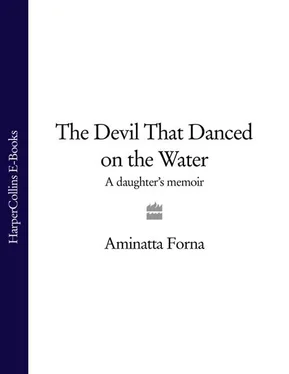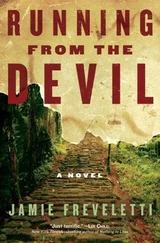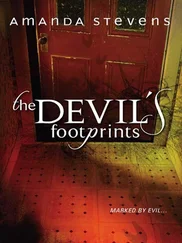My stepmother drives up in her Volkswagen and goes through to the master bedroom. A little while later our father comes home, running through the rain.
I am restless. I fetch a game of bingo given to me for Christmas. It is an inexpensive set with small wooden discs upon which the characters are stamped, slightly irregularly, in red ink. Once I had unwrapped it I ignored it in favour of grander gifts, but this summer holiday I have rediscovered it and there have been several uproarious games involving the entire household.
We use matchsticks instead of money and today I ask Santigi to let me borrow the big box of Palm Tree matches. On the cover it has a drawing of an inky native stepping between two palm trees that reminds me of the pictures in an old book of Edward Lear poems I used to own. I empty the matches out and count them into neat red-tipped piles, one for each player.
Each card has a row of numbers along the top and another row of letters down the side. The caller must pick from corresponding bags of letters and numbers. As our games draw to a close everyone always starts to call the combinations they need to win. It’s the best part of the game. Some of us call our numbers out as loudly as possible; others jig with anticipation; Morlai half closes his eyelids and mutters the figures like an incantation. Whoever is calling blows his fingertips, plunges into the bag and with great theatrics calls the winning sequence. Since I own the set I get more turns to do this than anyone else.
The last time we reached this point our father was sitting in the front on the settee, his card covered with little torn squares of paper. He only needed one more to win but several others were in the same position. The atmosphere was intense, and yet there was one outcome in which we were all united: if you couldn’t win yourself the next best result was that our father should win. After a few games I had reached the point where I stopped wanting to win at all. Instead I wanted to protect my father from the disappointment I imagined he would feel if he lost.
I had been calling the numbers. My father needed a B and a five. He said: ‘Give me a B five, Am! B, five!’
Everyone was hopping about, waving, calling out. I took my time, drawing the process out for as long as possible. I closed my eyes. I wished for a B and a five. I put my hands in the bags simultaneously and pulled out two wooden discs.
‘B, five!’ I was astonished. I dropped the five back into the bag. No one believed I had actually drawn it. ‘I did, I did!’ I shouted and started to grow upset.
I saw my father watching me. He was not sure what to believe. He smiled as if to say, ‘You don’t have to do this, Am.’
Outside the truck has arrived. The two men are shovelling stones into the back. Afterwards the driver takes some money out of his pocket, flicks off two notes and hands them to the man who lives in the panbody , who nods in return but doesn’t smile. As the truck departs he leans on his shovel and watches.
On the coffee table I lay the bingo cards alongside the matchsticks. Outside the window a movement makes me look up. Two men have come up the outside stairs and are standing on the veranda looking in at me. I go out to see what they want. They are standing directly beneath the fluorescent strip light with their backs against the growing darkness; the white light casts downwards, bouncing off their cheeks and their foreheads, turning their eyes into dark orbs. I have never seen either man before but I sense something indefinably familiar about them. They are both slim, sinewy with close-cropped hair and they wear short-sleeved safari suits. One of them has on a pair of fake crocodile-skin shoes, of a type sold in the market. The shoes are badly scuffed. Who are these men? Many years later I will discover they are called Prince Ba and Newlove, names as surreal as stage names – or aliases. Their faces are impassive; they impart an air of unutterable menace. One of them tells me they are here to speak to the doctor.
My father appears directly and speaks to them for a few moments. My bingo set is beside me on the table ready for our game. He turns to me, sees that I am there and says: ‘I have to go with these two gentlemen now, Am.’
He walks ahead of the two men through the door and out onto the veranda. I see them pass the window.
‘Daddy, when are you coming back?’ I am unsettled.
My father half turns from me, seems to pass a hand across his eyes, takes a few more steps. Then he stops and faces me again. The two men wait and so do I. All my life my father has had a habit of chewing the ends of toothpicks. He always keeps a couple in his breast pocket. Now he says to me in a low voice: ‘Am, go and get me a couple of toothpicks.’
So I run to the sideboard on the other side of the room and find the little plastic toothpick dispenser. I shake out three or four toothpicks and hurry back to him. My face still holds the question. ‘Tell Mum I’ll be back later.’ These are the last words, the very last words he says to me. And he steps out into the rain.
At the bedroom door I call to my stepmother that my father is gone. A moment later she runs past me with Morlai right behind her. They run silently, eyes fixed ahead, and disappear into the crystal darkness. Through the rain I hear the sound of the car engine starting; the tyres splashing through the puddles.
The next morning we three children have our breakfast together, just the three of us. Outside the truck arrives and deposits another load of rocks. The rain is still coming down: it rains all through the day and the next night. It rains until October.
‘Daddy’s back!’ It was my brother. I had never seen him so excited, adult poise utterly cast aside. The early morning sun was bright and reflected in his face and eyes; his whole expression was radiant.
Everyone was smiling hard at me, Yabome and my sister. The same excitement glowed in their faces, too. Obviously, I was the last to find out and I stared up at them warily, not wanting to believe.
‘It’s a dream,’ I said at last.
‘No, it’s not. He’s really here.’
‘It’s a dream,’ I insisted. ‘I’ve had them before.’
Yabome put her arms across my shoulder and squeezed me. The others laughed; it was a beautiful, silver sound. ‘It’s true. He’s coming. Sheka and I are going to fetch him.’ And before I could shake the feeling of unreality that clung to me, they were gone.
I sat down again. Breakfast was laid at the big, wooden table. Memuna stayed behind with me, but she seemed to be taking events in her stride, as ever. Her calm was a source of envy for me. I, who became so easily heated and could be wound into a frenzy by my family.
When I was ten, after my father was taken away, I began to suffer migraines that remained undiagnosed for years. With the heels of my hands pressed against my temples I would run round the house making desperate circles, as though if I moved fast enough I might succeed in leaving the pain behind. Often there was nobody at home except for us three children, but if my stepmother or Santigi were in the house they’d take me to my bed, fetch me aspirins and try to subdue me, holding me by the shoulders and pushing me down against the pillows. It never worked: when they left I would cry and bang my head hard against the bare walls of the room.
I poured a glass of orange juice and drank half of it. I found myself dithering, unable even to find a place to put the glass. The table was laden with food and with the debris of a half-eaten breakfast. The room was part of a stately home, heavily furnished, oak-panelled and cold. I didn’t recognise the house, but it was familiar as the kind of old country house where I had gone to boarding school. Eventually others started to come down to breakfast: friends of mine, who joined us at the table. A red squirrel appeared at the window. It was large and had a strange, pointed face. To me it didn’t look much like a squirrel at all: the nose was too long, like a mongoose I once owned as a child.
Читать дальше












